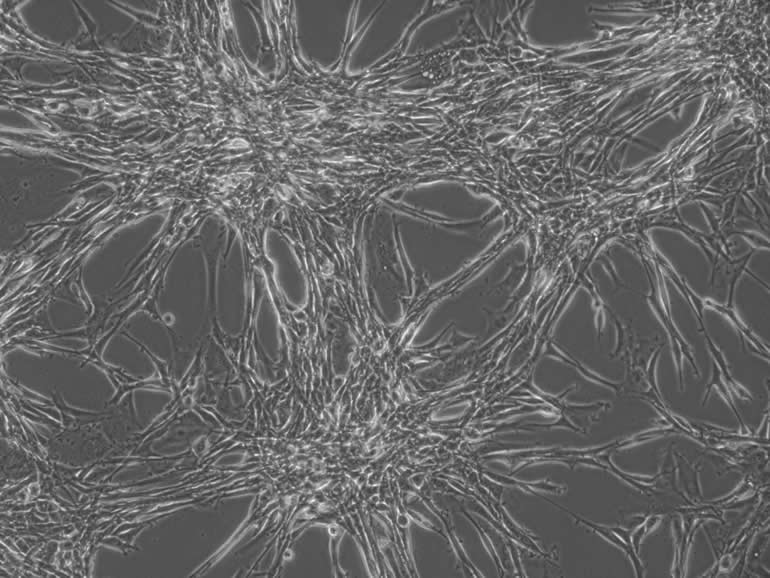Summary: Study reveals how two key molecules, Rab27b, and epiregulin, interact to contribute to radioresistance in glioblastoma brain cancer.
Source: Hokkaido University
Scientists have identified key molecules that mediate radioresistance in glioblastoma multiforme; these molecules are a potential target for the treatment of this brain cancer.
Glioblastoma multiforme (GBM), is the most aggressive type of brain cancer. It is treated by radiation therapy combined with chemotherapy. However, even with treatment, the five-year survival rate for GBM is less than 7%. One of the major causes for this is that GBM rapidly develops radioresistance (resistance to radiotherapy) by unknown mechanisms.
A team of scientists from Hokkaido University and Stanford University have revealed a mechanism by which GBM develops radioresistance. Their research, published in the journal Neuro-Oncology Advances, explains how two key molecules, Rab27b and epiregulin, interact to contribute to radioresistance in GBM.
The primary function of Rab27b is to regulate protein trafficking and secretion of molecules. Rab27b is also known to promote tumor progression and metastasis in several types of cancer. For these reasons, the scientists decided to investigate if Rab27b had any role to play in GBM.
Upon performing tests on human glioblastoma cell lines, the scientists showed that Rab27b expression was increased for at least seven days after exposure to radiation. Knockdown of Rab27b increased the sensitivity of glioblastoma cells to irradiation. These tests were replicated in an animal model: the glioblastoma cells were injected into mice, which were then subjected to radiation therapy. Rab27b knockdown combined with radiation therapy delayed tumor growth and prolonged mouse survival time.

As Rab27b is a regulator of protein trafficking, the scientists continued their work, looking for other molecules that contribute to radioresistance. They discovered that changes in the expression of Rab27b led to corresponding changes in the expression of epiregulin, a growth factor whose expression is known to increase in cancer cells; knocking down the expression of epiregulin increased the sensitivity to irradiation, as seen in the cells with Rab27b knockdown. Further, the scientists showed that increased expression of Rab27b and epiregulin in glioblastoma induced the proliferation of surrounding cancer cells, which could contribute to acquiring radioresistance. Finally, they analyzed gene expression data of GBM patients and found that upregulation of Rab27b and epiregulin correlated with poor prognosis of the patients.
By identifying the roles that Rab27b and epiregulin play in the development of radioresistance in GBM, the scientists have brought to light a novel target for drug development, and one that could significantly increase the survival rate for GBM.
Dr. Jin-Min Nam and Dr. Yasuhito Onodera are part of the Radiation Biology group at the Global Center for Biomedical Science and Engineering (GCB), a collaboration between Hokkaido University, Japan, and Stanford University, USA. The group specializes in molecular and cellular oncology, and radiation biology.
About this brain cancer research article
Source:
Garvan Institute of Medical Research
Contacts:
Sohail Keegan Pinto – Hokkaido University
Image Source:
The image is credited to Jin-Min Nam.
Original Research: Open access
“Rab27b contributes to radioresistance and exerts a paracrine effect via epiregulin in glioblastoma” by Soichiro Nishioka, Ping-Hsiu Wu, Toshiaki Yakabe, Amato J Giaccia, Quynh-Thu Le, Hidefumi Aoyama, Shinichi Shimizu, Hiroki Shirato, Yasuhito Onodera, Jin-Min Nam. Neuro-Oncology Advances.
Abstract
Rab27b contributes to radioresistance and exerts a paracrine effect via epiregulin in glioblastoma
Background
Radiotherapy is the standard treatment for glioblastoma multiforme (GBM). However, radioresistance of GBM cells leads to recurrence and poor patient prognosis. Recent studies suggest that secretion factors have important roles in radioresistance of tumor cells. This study aims to determine whether Rab27b, a small GTPase involved in secretory vesicle trafficking, plays a role in radioresistance of GBM.
Methods
Microarray analysis, cell viability analysis, apoptosis assay, immunostaining, and in vivo experiments were performed to assess the effect of Rab27b on radioresistance of GBM. We further investigated paracrine effects mediated by Rab27b after X-ray irradiation using co-culture systems of glioma cell lines.
Results
Rab27b was specifically upregulated in irradiated U87MG cells. Furthermore, Rab27b knockdown decreased the proliferation of GBM cells after irradiation. Knockdown of Rab27b in U87MG cells combined with radiation treatment suppressed orthotopic tumor growth in the mouse brain and prolonged the survival of recipient mice. Interestingly, co-upregulation of Rab27b and epiregulin (EREG), a member of the epidermal growth factor (EGF) family, correlated with radioresistance in glioma cell lines. Additionally, EREG, which was secreted from U87MG cells via Rab27b-mediated mechanism, activated EGF receptor and contributed to H4 cell proliferation in a paracrine manner.
Conclusions
Our results show that Rab27b mediates the radioresistance of highly malignant GBM cells. Rab27b promotes the proliferation of adjacent cells through EREG-mediated paracrine signaling after irradiation. Thus, the Rab27b-EREG pathway is a novel potential target to improve the efficacy of radiotherapy in GBM.






